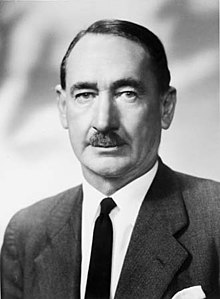Charles Barnes
Charles Edward "Ceb" Barnes (born November 13, 1901 in Einasleigh , Queensland , † October 24, 1998 ) was an Australian politician of the National Party of Australia , who was a member of the House of Representatives from 1958 to 1972 and was a minister several times.
Life
Charles Edward "Ceb" Barnes, who grew up on farms in Hughenden and Warwick , and began his career with the Union Trustee Company after graduating in 1918 . In 1939 he took over the two closed gold mines Louisa and British Lion on the Palmer River in north Queensland and founded his own gold mining company. However, due to the poor yields and the rationing caused by the Second World War , he ceased operations in 1941. In the further course of the war he joined the Royal Australian Air Force (RAAF) on November 9, 1942 and subsequently served in Australia and New Guinea , last he was promoted to first lieutenant (flying officer) before he left active on September 13, 1944 Retired from military service. After the war, he took over the Canning Downs Station by his father and developed it into a successful thoroughbreds - horse breeding operation . He was involved in the Queensland Turf Club founded in 1863 and won the Caulfield Cup in 1951 with the horse "Basha Felika" from his breeding .
Ceb Barnes began his political career when he was elected to the House of Representatives for the first time on November 22, 1958 for the Country Party in the safe constituency of McPherson as the successor to former Prime Minister Arthur Fadden and was a member of the House of Representatives until his resignation on November 2, 1972.
On 18 December 1963 Barnes was to succeed Paul Hasluck in the government Menzies VIII office as Minister for Territories (Minister for Territories) and held that post in the government Holt I (Jan 26 to 14 December 1966), the Holt II government (December 14, 1966 to December 19, 1967), in the McEwen cabinet (December 19, 1967 to January 10, 1968), and in the Gorton I government (January 10 to February 28, 1968). Subsequently, he took over in the government of Gorton II on February 28, 1968, the now renamed office of Minister for External Territories (Minister for External Territories) , which he also in the Gorton III government (November 12, 1969 to March 10, 1971) and in in the McMahon government from March 10, 1971 to January 25, 1972. On February 5, 1972 he was replaced by Andrew Peacock in the course of a cabinet reshuffle . At the time, it was one of the most powerful ministries for the territories and external territories , as it was responsible for Papua New Guinea , the Northern Territory and the Australian Capital Territory . In this role Barnes was involved in the preparations for the independence of Papua New Guinea and also dealt with Aboriginal affairs . Barnes was until 1964 as a possible successor to the chairman of the Country Party John McEwen , whose resignation from politics was expected.
Shortly before he left government and the House of Representatives, Charles Barnes devoted himself to horse breeding and equestrian sports. The horse Tails he bred took third place in the Melbourne Cup , the world's most endowed long-distance race, in 1971 and was considered the best horse racehorse in Australia after the horse Tulloch . He is also active as President of the Warwick Show and Rodeo Society . The Ceb Barnes Plate was named in his honor and is awarded at the annual Eagle Farm Race Track for the Queensland Cup in November . His cousin was the politician Michael Bruxner , who was, among other things, Deputy Prime Minister of New South Wales for several years .
Web links
- Parliamentary Handbook for the 45th Parliament. (PDF; 13.4 MB) Parliament of Australia, accessed on October 2, 2019 .
- Entry in Prabook
Individual evidence
- ↑ John McEwen actually remained party chairman until 1971, and after the death of Harold Holt in a swimming accident between December 19, 1967 and January 10, 1968, he also temporarily served as prime minister.
| personal data | |
|---|---|
| SURNAME | Barnes, Charles |
| ALTERNATIVE NAMES | Barnes, Charles Edward (full name); Ceb (nickname) |
| BRIEF DESCRIPTION | Australian politician and horse breeder |
| DATE OF BIRTH | November 13, 1901 |
| PLACE OF BIRTH | Einasleigh , Queensland |
| DATE OF DEATH | October 24, 1998 |
